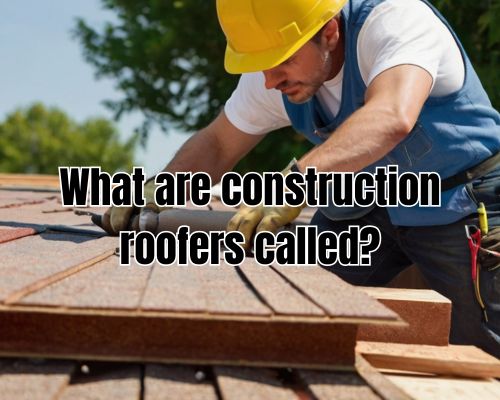When it comes to construction in New Jersey, the roof is more than just a finishing touch—it’s a critical component of a building’s integrity and energy efficiency. Yet many people still ask, “What are construction roofers called?” It’s a simple question with layers of nuance, especially in a highly regulated and professionally diverse state like New Jersey.

With Charles Jimerson of CJ Commercial Roofing NJ, we’ll unpack that question, explore different roofing job titles, and examine their responsibilities. Along the way, we’ll tie in relevant industry terms, location-specific insights, and key related concepts (LSI keywords) such as roofing contractors, licensed roofers, shingle installers, commercial roofing specialists, and union roofers in New Jersey.
🏗️ What Are Construction Roofers Called?
In the construction industry, those who specialize in installing, repairing, and maintaining roofs are commonly referred to as roofers. However, this is a broad term. The more accurate and industry-specific titles include:
- Roofing Contractor
- Roofing Technician
- Journeyman Roofer
- Shingle Installer
- Flat Roof Specialist
- Commercial Roofer
- Residential Roofer
- Union Roofer (particularly in New Jersey)
- Apprentice Roofer (entry-level position)
- Lead Roofer or Foreman Roofer (supervisory role)
Each title reflects a different skill level, specialization, or role within a roofing project. In many parts of the U.S., especially states like New Jersey, the title “roofing contractor” is legally recognized and often licensed separately from general contractors.
🧱 Roofing Roles and Responsibilities
Whether on a suburban home in Edison or a commercial structure in Jersey City, roofers are responsible for the proper installation and long-term durability of the roofing system. Their daily tasks include:
- Measuring and cutting roofing materials (like asphalt shingles, slate, or metal)
- Installing underlayment, flashing, and weatherproof barriers
- Repairing damaged areas and replacing aging materials
- Ensuring proper drainage and venting systems
- Following local New Jersey building codes and OSHA safety standards
Specialist roofers might focus on particular systems, such as:
- EPDM, TPO, or PVC flat roofing (commonly used in commercial buildings in Newark and Trenton)
- Cedar shakes and asphalt shingles (popular in residential neighborhoods like Morristown or Cherry Hill)
- Metal roofing (growing in energy-efficient homes throughout New Jersey)
🧾 Are Roofing Contractors the Same as Roofers?
This is a common point of confusion. All roofing contractors are roofers, but not all roofers are contractors.
- A roofer is someone who physically performs the work—cutting shingles, applying tar, or sealing seams.
- A roofing contractor, on the other hand, typically manages the job and holds the necessary licensing and insurance to legally operate a roofing business in New Jersey.
In many New Jersey municipalities, such as Paterson or Atlantic City, roofing contractors are required to register with the New Jersey Division of Consumer Affairs, carry liability insurance, and follow zoning and permitting rules.
🏙️ Roofing in New Jersey: A Local Perspective
The demand for qualified roofing professionals in New Jersey is on the rise. With the state’s blend of historic architecture and coastal exposure, roofing projects require both precision and regional knowledge.
✅ Common Roofing Materials in NJ:
- Asphalt shingles (affordable and easy to replace)
- Flat membrane systems (in cities like Camden and Hoboken)
- Metal roofing (increasing in sustainable homes)
- Slate or tile roofing (seen in historic homes around Princeton or Montclair)
✅ Local Roofing Licenses and Labor:
- Union Roofers Local 10, based in Newark, is part of the United Union of Roofers, Waterproofers & Allied Workers.
- Many major roofing projects in urban areas like Jersey City are staffed by union-certified journeymen and apprentice roofers.
💼 Types of Construction Roofers in New Jersey
Let’s break down the common types of construction roofers found throughout New Jersey:
1. Residential Roofers
These professionals focus on homes and small structures. You’ll see them working on pitched roofs in places like Toms River or Summit. They often work with asphalt shingles, wood shakes, or synthetic tiles.
2. Commercial Roofers
Handling larger-scale projects, these roofers are trained in flat-roof systems and are often employed by roofing companies in Newark, Elizabeth, or Parsippany. They must understand thermal insulation, drainage systems, and commercial safety codes.
3. Industrial Roofers
These roofers work on warehouses, factories, and government buildings. You might find them working on metal seam systems or solar-integrated roofing in areas like Linden or Woodbridge.
4. Repair and Maintenance Roofers
These professionals are often called in post-storm or during seasonal maintenance cycles. After Nor’easters or heavy snowfalls common in New Jersey winters, roofers specializing in emergency leak repair are in high demand.
💡 SEO-Integrated Insight: Roofing Jobs and Titles
To further optimize this article, it’s worth noting some search engine optimized variations of the focus keyword:
- “What do you call someone who works on roofs?”
- “Different types of roofing contractors”
- “Certified roofer in New Jersey”
- “Union roofer job titles”
- “New Jersey roofing specialist license”
- “Journeyman vs apprentice roofer in NJ”
Including these LSI keywords and semantic variants ensures that this content captures a wide range of search queries, appealing to local users, homeowners, and industry professionals alike.
🧠 How to Choose the Right Roofer in New Jersey
If you’re hiring a roofer in the Garden State, ask these questions:
- Are you licensed in New Jersey?
- Do you carry liability and worker’s compensation insurance?
- What roofing systems are you certified to install?
- Do you belong to any trade unions or associations like NRCA?
- Can you provide recent references from Bergen County or Monmouth County?
For more, visit CJ Commercial Roofing NJ.
📈 Final Thoughts: Beyond the Label
So, what are construction roofers called?
They’re more than just “roofers.” They’re skilled tradespeople with specialized knowledge, whether labeled as licensed roofing contractors, union journeymen, commercial specialists, or residential technicians. And in New Jersey, where weather, architecture, and regulation vary from city to shore, these professionals are vital to every phase of the building process.
Whether you’re replacing shingles in Freehold or installing a TPO membrane in Atlantic City, choosing the right kind of roofing expert—and understanding what they’re called—can make all the difference in the success and longevity of your project.
